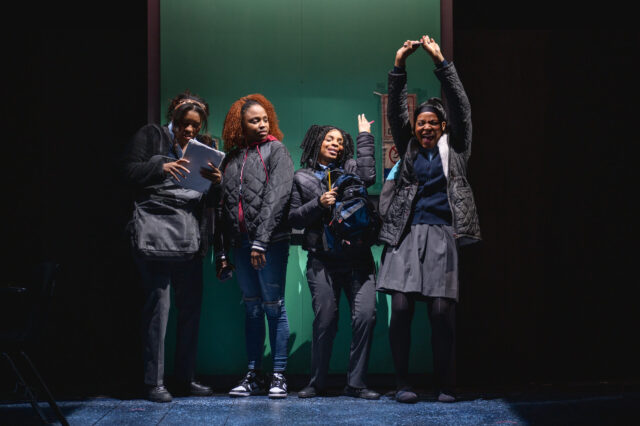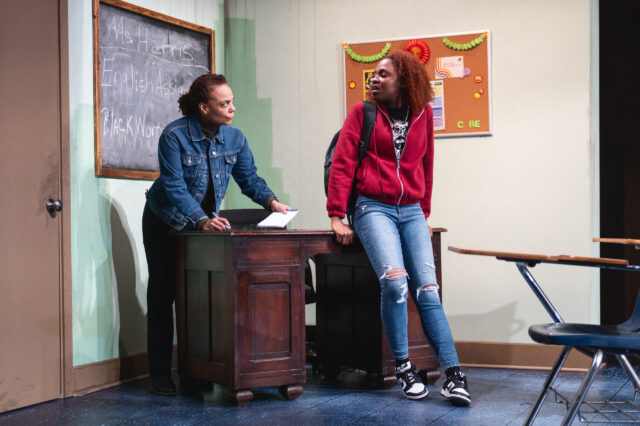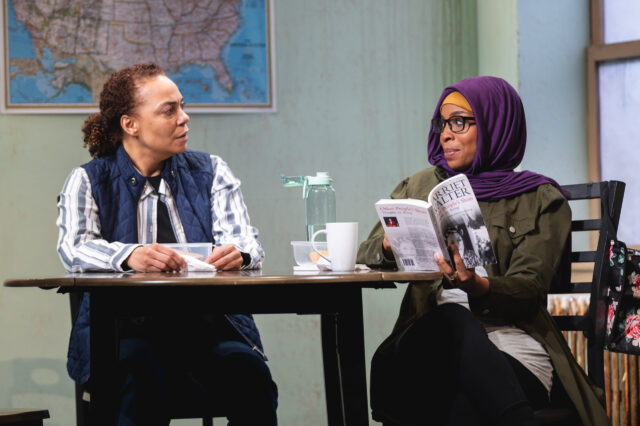
Latricia (Torée Alexandre), LaRonda (Mikayla LaShae Bartholomew), Lakkayyah (Morgan Siobhan Green), and LaNeeyah (Margaret Odette) take the same elevator to different schools in Fish (Valerie Terranova Photography)
FISH
Theatre Row
410 West 42nd St. between Ninth & Tenth Aves.
Tuesday – Sunday through April 20, $70
www.keencompany.org
theworkingtheater.org
In the prologue to her debut novel, 1970’s The Bluest Eye, Toni Morrison recalls Dick and Jane and their children, a fictional, white middle-class family created in 1930 to help kids learn to read; for nearly four decades, they represented the American dream. Morrison writes, “Here is the house. It is green and white. It has a red door. It is very pretty. Here is the family. Mother, Father, Dick, and Jane live in the green-and-white house. They are very happy.” She shares further details of their idyllic existence, then repeats the paragraph twice, the words getting closer and closer until they are essentially unreadable. The dream is not for everyone.
The Bluest Eye plays a key role in Kia Corthron’s Fish, a coproduction of Keen Company and Working Theater that opened last night at Theatre Row. The hundred-minute show takes place primarily at a public school in an unidentified city in the present. It begins with four teenage girls, Latricia (Torée Alexandre), LaRonda (Mikayla LaShae Bartholomew), Lakkayyah (Morgan Siobhan Green), and LaNeeyah (Margaret Odette), meeting in an elevator. Latricia, who now prefers to be called Tree, is heading to the terrible public school on the fifth floor, where teachers come and go, there are little or no supplies, students don’t care about their classes, the nurse is only part-time, and every day is a struggle. The other three girls have managed to avoid that hell by being chosen in a lottery to attend the prim and pristine Peak and Pinnacle charter school on the heavenly sixth floor, known as the Penthouse, where they have all the bells and whistles, including clean bathrooms, new textbooks, musical instruments, devoted teachers, and a computer lab.
Tree’s latest homeroom teacher, Jasmine Harris (Rachel Leslie), has given her detention. Tree already has an assignment to write a short paper on a historical or contemporary Black woman, but Ms. Harris adds to her load by telling her she has to write another essay, on The Bluest Eye.
Tree argues, “I ain’t got time to write no hundred-word report! I gotta pick up my brother sixteen minutes, I gotta make the mac n cheese dinner and half the cheese clumps together! I ain’t some suburb desktop PC swimming pool, I’m real!” With her mother in jail and no father in the picture, Tree is taking care of her eleven-year-old asthmatic brother, Zay (Josiah Gaffney); she angrily explains that she doesn’t have a computer at home, has no time to go to the library, and can’t afford to buy any book. Ms. Harris unlocks her desk — she doesn’t trust the students, expecting them to steal from her — and hands Tree her personal copy, but she insists that Tree come in early and stay late each day to read it; she won’t just lend it out.
When tragedy strikes, Tree can only rely on herself to get through it.

Jasmine Harris (Rachel Leslie) tries to get through to Tree (Torée Alexandre) in play about failing education system (Valerie Terranova Photography)
Later, Tree tells Ms. Harris, “Oh wait, don’t tell me. First you was all idealism, all ‘I wanna make a change.’ But the years make you hard. Bitter. Now just bidin till retirement. That your cliché?” For much of the play, Corthron (Tempestuous Elements, A Cool Dip in the Barren Saharan Crick) and Williams (The Gospel Woman, A Limbo Large and Broad) successfully exploit clichés to make their points about an unfair, racially biased education system and social structure. Each scene is named after subjects, but they have multiple meanings — Homeroom deals with life at home, Speech and Debate involves an argument between Ms. Harris and Tree that gets personal, Social Studies explores friendship in and out of the classroom, Women’s Studies reveals surprising facts about Ms. Harris, and Geography is about searching for one’s place in the world.
But the last third of the play becomes mired in clichéd scenarios that are stale and obvious, hampered by concluding scenes that offer overly simplistic solutions while casting aside the conflicts that had driven the narrative up to that point. Corthron touches on such contemporary issues as standardized testing, budget cuts, teacher strikes, grading scandals, and school shootings in a kitchen-sink barrage, trying to squeeze in too much instead of concentrating on her well-developed characters.
The strong all-BIPOC ensemble does its best, but there’s not much they can do as the dialogue devolves into platitudes. The production lacks subtlety even in its smallest details, as when teacher Nabila Muhammad (Green) is quietly reading Other People’s Shoes, a memoir by award-winning white British actress Harriet Walter. The name “Tree” itself raises ideals of establishing roots and blooming, And I’m still trying to forget when Nadeem (Christopher B. Portley) asks Jasmine, “What’s a ‘scar city’?” upon seeing the word “scarcity” on a test.

Teachers Jasmine Harris (Rachel Leslie) and Nabila Muhammad (Morgan Siobhan Green) take a break in Fish (Valerie Terranova Photography)
Fish comes on the heels of two recent plays that explore similar issues in more nuanced and effective ways, Donja R. Love’s soft and Dave Harris’s Exception to the Rule, powerful works that challenge the audience while taking on the education system.
The evening I saw Fish, the fluorescent lights on the left side of Jason Simms’s set — divided into a classroom, a center section that changes from an elevator to a living room, and a table in the teachers lounge — flickered on and off. I thought it was representative of the shoddy state of the public school, but it turned out that it was a technical problem and the play had to be paused for several minutes. (The lighting is by Nic Vincent, with sound by Michael Keck and realistic costumes by Mika Eubanks.)
One of the show’s leitmotifs is the adage “Give a man a fish, you’ll feed him for a day. Teach a man to fish, he’ll eat for a lifetime,” which is where the title of the play comes from, but here it feels trite and unnecessary. Meanwhile, the P&P students are assigned Ernest Hemingway’s 1952 novella, The Old Man and the Sea, in which the protagonist catches a marlin but has a battle on his hands to bring it to shore. Fish casts a wide net, but it ultimately comes away empty-handed.
[Mark Rifkin is a Brooklyn-born, Manhattan-based writer and editor; you can follow him on Substack here.]